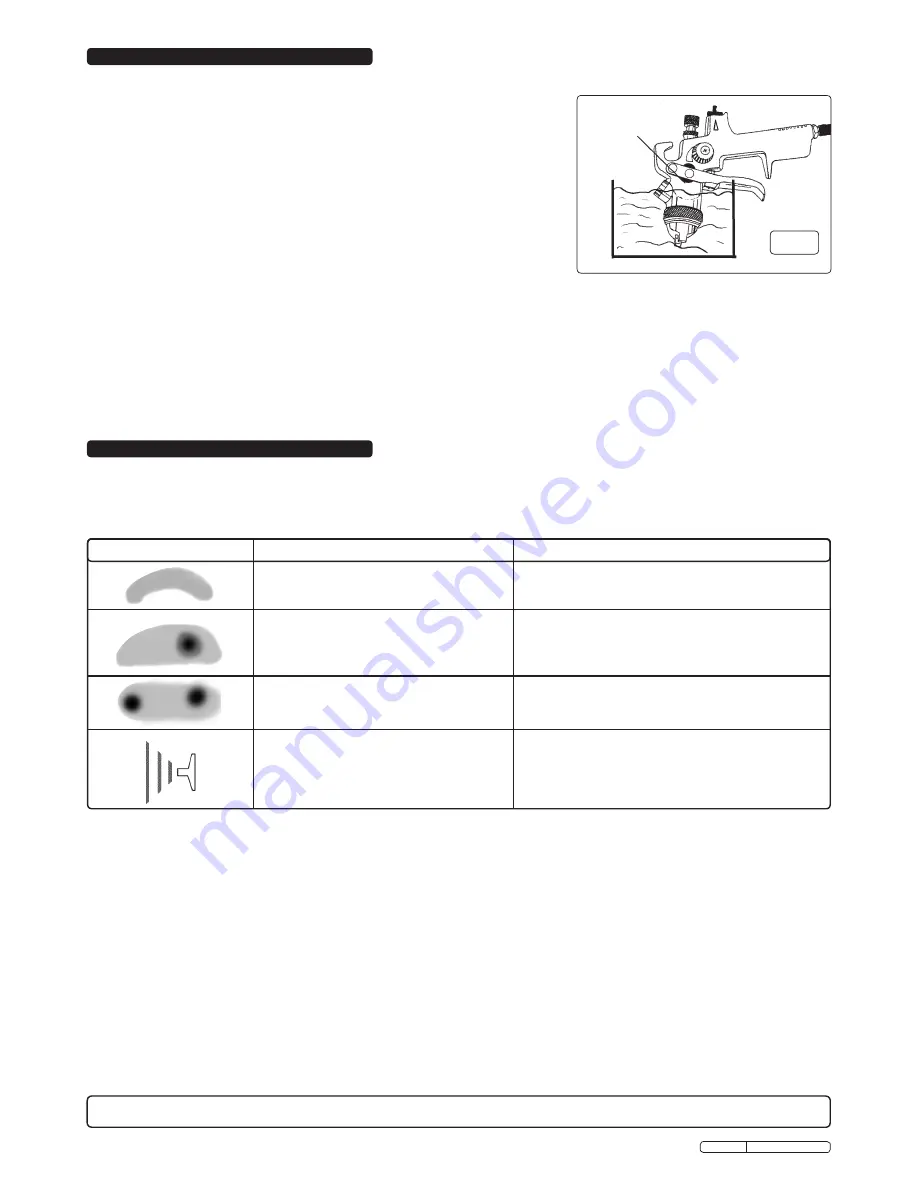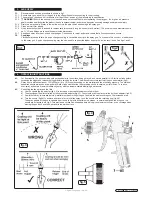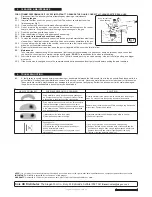
FOR OPTIMUM PERFORMANCE IT IS VERY IMPORTANT TO ENSURE THE GUN IS CORRECTLY CLEANED AFTER EACH USE.
disconnect from the air supply before attempting any cleaning or maintenance.
5.1.
Cleaning the gun
5.1.1. Immerse the front end of the gun only in solvent. the solvent should just cover the
fluid connection (fig.7).
5.1.2. use a bristle brush and solvent to wash off accumulated paint.
5.1.3. do not immerse the entire gun in solvent as this will cause lubricants on the rubber
seals to dissolve. dirty solvent may also clog narrow passages in the gun.
5.1.4. Flush the gun through with clean solvent.
5.1.5. Wipe the outside of the gun with a dampened solvent rag.
5.2.
Air nozzle, fluid nozzle and needle assembly
5.2.1. to clean the nozzles, soak them in solvent to dissolve any dried material then blow them
clean with air. Handle all nozzles carefully and do not make any alterations in the gun.
5.2.2. If you need to probe the holes in the nozzles, be sure to use a tool that is softer than
brass; do not use metal instruments.
5.2.3. Adjust the fluid needle valve so that when the gun is triggered, air flow occurs before fluid flow.
5.3. Maintenance
take care when re-assembling. screw parts hand tight to avoid cross-threading. If a part cannot easily be turned by hand, check that
you have the correct part, or unscrew, realign and try again.
DO NOT
use excessive force when re-assembling.
5.3.1. Lubricate the gun daily, use a light machine oil on the fluid needle packing, air valve packing, side port control packing and trigger
pivot point.
5.3.2. If the nozzle size is changed, ensure the complete nozzle set is exchanged. Insert paint nozzle before putting the paint needle in.
6.1.
A faulty spray is usually caused by improper cleaning or dried material around the fluid nozzle tip or in the air nozzle. soak these parts in a
solvent that will soften the dried material and remove with a brush or a cloth. never use metal instruments to clean the air or fluid nozzles.
these parts are carefully machined and any damage to them will cause a faulty spray. If either the air nozzle or fluid nozzle is damaged,
the part must be replaced before a perfect spray can be obtained.
dried material in a dirty side port restricts passage of
air. Greater flow of air from the cleaner side port forces
a fan pattern in the direction of the clogged side.
dried material around the outside of the fluid nozzle tip
restricts the passage of atomizing air at one point
through the centre opening of the air nozzle and results
in the pattern shown. this pattern can also be caused
by a loose air nozzle.
1) Material too thin/ too wide a spray.
2) Atomisation air pressure too high.
spitting due to:
1) dried out packing around needle valve.
2) dirt between the fluid nozzle seat and body or
loosely installed fluid nozzle.
3) Loose or defective swivel nut on syphon cup or
material hose.
dissolve material in the side ports with solvent, then blow the gun
clean. do not poke into the opening with metal instruments.
remove the air nozzle and wipe off fluid tip using a rag dampened
with solvent. tighten the air nozzle.
1) Increase material control & adjust spray width to narrow..
2) reduce air pressure.
1) use a light machine oil on the needle valve packing.
2) remove the fluid nozzle, clean the back of the nozzle and the
nozzle seat in the gun body using a rag dampened with thinner.
replace the nozzle and secure it tightly against the body.
3) tighten or replace defective swivel nut.
VIeW oF ProbLeM
PossIbLe reAson For ProbLeM
soLutIon
5. CLEANING & MAINTENANCE
6. TROUbLESHOOTING
Keep solvent level
below packing
fig.7
Sole UK Distributor:
the siegen tool co., bury st. edmunds, suffolk IP32 7Ar
E-mail:
sales@siegen.co.uk
NOTE:
It is our policy to continually improve products and as such we reserve the right to alter data, specifications and component parts without prior notice.
IMPORTANT:
no liability is accepted for incorrect use of this product.
WARRANTY:
Guarantee is 12 months from purchase date, proof of which will be required for any claim.
Original Language Version
s775G Issue: 1 - 21/06/10





















